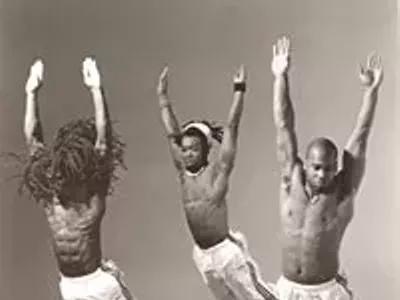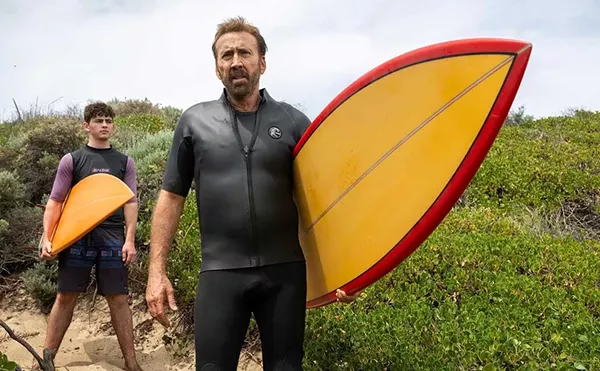
Audio By Carbonatix
[
{
"name": "GPT - Leaderboard - Inline - Content",
"component": "35519556",
"insertPoint": "5th",
"startingPoint": "3",
"requiredCountToDisplay": "3",
"maxInsertions": 100,
"adList": [
{
"adPreset": "LeaderboardInline"
}
]
}
]
Orange County is a movie that lacks the courage to follow through on its more restrained intentions. It was written by Mike White, the writer-star of the somewhat creepy indie favorite Chuck & Buck (2000), and does show signs of aiming a tad above the heads of the usual developmentally arrested twentysomething demographic of the dreaded teen movie. Yet it is, in the end, a rather conventional comedy of errors in the guise of a coming-of-age or, rather, getting-into-college, morality tale.
It’s also something of a second-generation showcase, having been directed by Jake (son of Lawrence) Kasdan and starring Colin (son of Tom) Hanks and Schuyler (daughter of Sissy Spacek) Fisk. So, important things first: Colin doesn’t look much like his old man but sounds like him, while Schuyler looks a lot like Sissy but doesn’t sound like her. As for Kasdan, on the strength of this and the eccentric Bill Pullman vehicle Zero Effect (1998), which he also wrote, I guess he could be called promising.
The movie is rife with movie-only tropes, things which, given a moment’s reflection, strain credulity but which, in the context of White’s satirical scenario, are fairly plausible. Young Colin plays Shaun Brumder, an Orange County surfer and slacker whose life is changed one day when he finds a book half-buried in the sandy beach. The book is called Straight Jacket, written by one Marcus Skinner. Though we’re never told what it’s about, for Shaun it’s a life-changing epiphany; after reading it 52 times, he decides to give up his pointless drifting through life and aim for the exalted goal of becoming a writer. This isn’t that much of a metamorphosis, since from the get-go Shaun gives the impression of being sensitive and probably intelligent. The whole surfer thing seems like an excuse to give him two buds who can do tag-team Jeff Spicoli bits.
Being a writer, of course, means going to college (at least in the movies). So Shaun tries to get into Stanford, something he has a good shot at until a ditzy guidance counselor (Lily Tomlin, being annoying) sends the college the wrong transcript and he’s rejected. Now things become, in the spirit of comic escalation, much more complicated than necessary, while at the same time adhering to the tried and true formula of sinking the hero’s hopes as far as possible before the final denouement of reprieve, redemption and smiles all around.
So the film is slight and sort of corny but watchable, thanks in part to its secondary cast. Shaun’s parents are separated and he lives with his mother, played by Catherine O’Hara doing her boozy out-of-control shtick. Pops is played by John Lithgow, who started his career as a sturdy, often villainous character actor and has evolved into a comically pompous one. O’Hara’s fellow “SCTV” alumnus Harold Ramis plays the Stanford dean and Kevin Kline exudes buttoned-down academic wisdom as the venerable Skinner. This is the movie’s subtext: Shaun doesn’t want to become a writer so much as a tenured professor — no wonder the book is called Straight Jacket.
Then there’s Shaun’s brother, played by Jack Black in full force-of-nature mode (this is another movie-only thing — in real life it would be hard to believe that Hanks and Black were cousins, let alone brothers). Black can be counted on to spice up a movie but he can also throw it off balance. That’s not necessarily a bad thing, though here it’s a close call as to whether he’s subverting the essential uplift of White’s story or saving it from its more hokey tendencies. Probably both.
Black comes on like John Belushi with a bit more comic range, cheerfully obnoxious and trailing destruction in his wake. He’s the wildly improbable factor who makes everyone, even O’Hara and Lithgow, seem relatively subtle. Anyway, his presence gives marketers an angle on how to sell the flick to the extent that two short bits of Black doing his thing are currently being run on MTV as trailers, even though they aren’t in the movie. And who can blame them, even though it’s a move that might backfire: You go to see a film about Black behaving badly and end up seeing one where he takes a back seat to an essentially sweet tale about a nice kid who wants to be a writer. And then the joke’s on you.
Richard C. Walls writes about the arts for Metro Times. E-mail him at letters@metrotimes.com.





